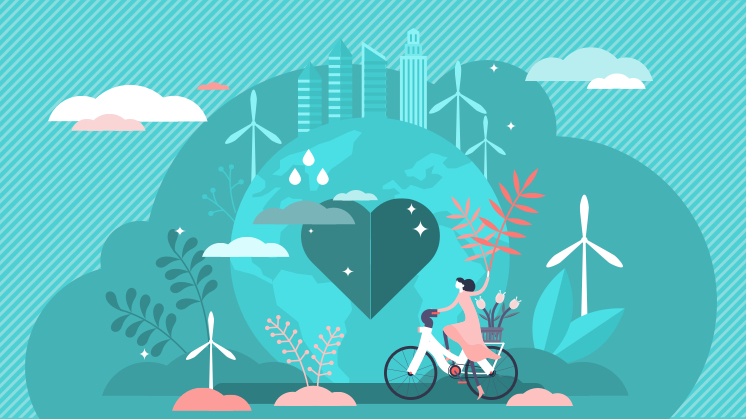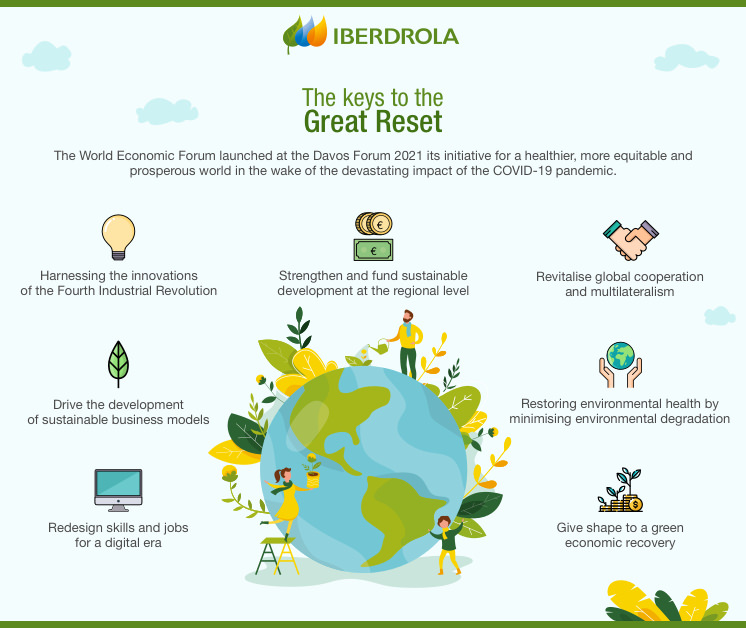Great Reset
Great Reset: for a healthier, more equitable and prosperous post COVID-19 world
The World Economic Forum unveiled at the Davos Forum 2021 its initiative to improve the state of the world in the wake of the devastating impact of COVID-19. Its name: The Great Reset. To do this end, they call for simultaneous global management of the consequences of the pandemic by all stakeholders. The following is a summary of the main aspects of the proposal.

We talk about performing a reset when a system can no longer operate under its current parameters and needs to be restarted. It is the button that we press, for example, when our computer or mobile phone is malfunctioning or stops working. The crisis caused by the COVID-19 pandemic has exposed some systemic flaws, highlighting the need to reset the global economy and its models.
THE ECONOMIC AND SOCIAL CRISIS POST-COVID-19
According to data released by the International Monetary Fund (IMF), the global economy shrunk by 4.9% in 2020, but the losses were not uniform. While GDP fell by 7.2 % in the European Union (EU), in emerging countries as a whole the fall was more moderate at 2.4 %. This severe collapse has hit low-income earners, youth and women particularly hard.
The COVID-19 pandemic will leave deep economic scars in many countries. In addition to the severe upheavals in the labour market due to job losses, here are the large number of companies at risk of bankruptcy as their cash reserves are depleted and the impact on future human capital, as the education of more than 1 billion students in 162 countries has been disrupted.
The underlying problem is that the pandemic will probably increase poverty and inequality in the short to mid-term, revealing the deficiencies in health systems, the precarious nature of employment and the difficult outlook for young people when it comes to getting the opportunities they are crying out for. Which is why Klaus Schwab, president of the World Economic Forum (WEF), is suggesting an alternative: A Great Reset of the world economy that would allow to adopt a different model.
WHAT IS THE GREAT RESET? AIMS
During the Davos 2021 Forum, an event organised by the WEF, laid the foundations for the Great Reset. The underlying idea is that the world was not prepared for a crisis like the current COVID-19 pandemic and that it needs to be more sustainable and resistant to sudden changes in external conditions, something that may be exacerbated by a phenomenon like climate change.
If the crisis caused by the pandemic is not addressed, the consequences will get worse and the world will become a more fragile place. To avoid such a scenario, Schwab assures that gradual measures and ad hoc solutions are not enough, and that new foundations must be laid to support the economic and social system. The veteran german economist described the three basic objectives of the Great Reset, inviting all countries and sectors to participate:
- The creation of stakeholder capitalism, which will replace shareholder capitalism. The idea of this system is that companies will work for the common good rather than immediate profits and benefits alone.
- The construction of a more resilient, equitative and sustainable system based on environmental, social and governance metrics (ESG criteria).
- Harnessing innovations innate to the Fourth Industrial Revolution for the public good, nourishing greener, smarter and fairer growth.
"The pandemic represents an unusual, short term opportunity to reflect, rethink and reboot our world"
Klaus Schwab, founder and President of the World Economic Forum
The Great Reset will not be easy, as the pandemic keeps the world in a state of uncertainty and our capacity to react is being hindered in a society based on interpersonal connections and where the economy, politics, the environment and technology are constantly influencing one another. Young people, particularly affected by climate change and a lack of opportunities, must lead this change, pushing companies to offer more sustainable products and services in the future.

SEE INFOGRAPHIC: The keys to the Great Reset [PDF] External link, opens in new window.
STRATEGIES TO DRIVE THE GREAT RESET
Kristalina Georgieva, managing director of the IMF, assures that human beings have a unique opportunity to transform the world and make it a better place: fairer and more equitable, greener and more sustainable, smarter and, above all, more resilient. To aspire to this, she believes that the following measures need to be taken:
"The best memorial we can build for those who lost their lives in the pandemic is a greener, smarter and fairer world."
Kristalina Georgieva, managing director of the IMF
Invest in people, in education, health and social protection, and in avoiding the sharp rise in inequality that this crisis could trigger.
Promote low-carbon growth to help achieve climate neutrality, through, for example, a rational allocation of public expenditure.
Take advantage of the digital transformation, whether by expanding the use of e-government platforms to improve efficiency and transparency or by using distance learning or remote working.




